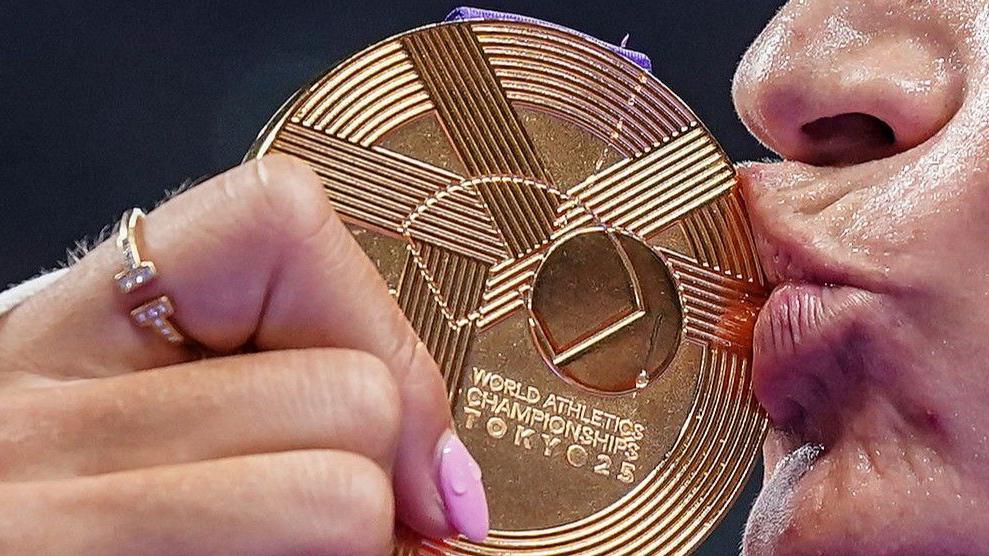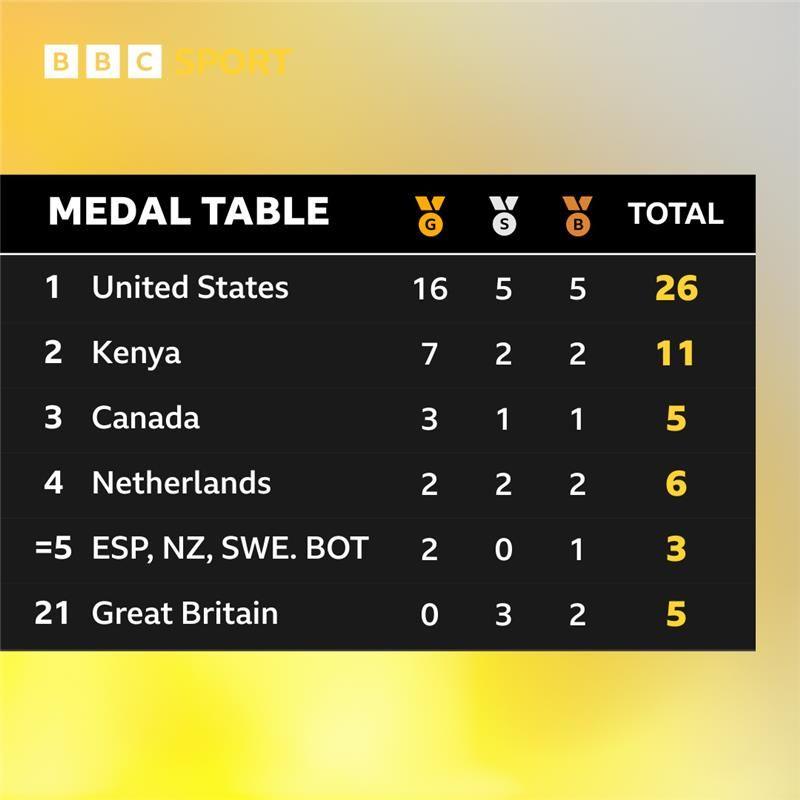GB fail to win gold for first time in 20 years - where it went wrong

Great Britain also won five medals in Doha in 2019, before winning seven in Eugene and 10 in Budapest two years ago
- Published
Great Britain and Northern Ireland failed to win a gold medal at a World Athletics Championships for the first time in 22 years, as they secured their joint-lowest overall return since 2005.
GB ended the nine-day competition with a total of five medals, level with their 2019 tally in Doha, while they last won fewer 20 years ago in Helsinki - where they finished with three.
Great Britain head coach Paula Dunn told BBC Sport that the aim for Tokyo was to win five to eight medals - but no target was set for a medal table finish.
The 64-strong British squad finished 21st in the medal table.
The team's fortunes were summed up in the event which provided their final medal opportunity in Japan, as the women's 4x100m relay quartet - winners of Olympic silver last year - finished two-tenths of a second off the podium.
That confirmed Great Britain would fail to win a relay medal, of any colour, for the first time since Paris in 2003.
That was also the last occasion they finished without a gold.
It comes after the team equalled their best haul of 10 medals to finish seventh at the previous World Championships two years ago.
On that occasion, they brought home two gold medals, three silvers and five bronze from Budapest.
They also achieved GB's best return at an Olympics for 40 years with 10 athletics medals at Paris 2024.
Reflecting on the championships, Dunn said: "Definitely a mixed bag. Five medals which is good and I'm pleased to see, and some missed opportunities.
"So it's time for us to go back sit down with the coaches and athletes, reflect and do a review and see how we move forward."
Hunter Bell edges out Hodgkinson as GB win 800m silver and bronze
- Published21 September
World Athletics medal table - and GB medallists
- Published21 September
No relay medals in Tokyo - what went wrong for GB's squads?
- Published21 September
In Tokyo, Jake Wightman ended GB's medal wait on day five with men's 1500m silver, before Amy Hunt claimed her first global individual medal with silver in the women's 200m.
Katarina Johnson-Thompson shared bronze in a dramatic heptathlon finale on Saturday.
Georgia Hunter Bell led Olympic champion Keely Hodgkinson to a British medal double in the women's 800m final, however their bid for a stunning one-two was spoiled by Kenya's Lilian Odira in Tokyo.
There was some misfortune among the disappointment, with defending 1500m champion Josh Kerr, Olympic and world 400m silver medallist Matthew Hudson-Smith and 2024 world indoor pole vault champion Molly Caudery each suffering injuries.
Elsewhere, marathon runner Emile Cairess could not complete the men's marathon, which took place amid high temperatures and stifling humidity.
Despite relay medals supplying five of GB's 10 athletics medals at last summer's Games, there was no success here - with the men's 4x100m quartet failing to get the baton round in their heat.
Tokyo ended a run of five successive years with a global championships, although World Athletics will hold its inaugural Ultimate Championships next year to fill the gap before the World Championships in Beijing in 2027.
During the championships, the conditions in which the athletes have had to compete and the distance between the warm-up facilities and the stadium have both been raised as issues.
Temperatures above 30C were accompanied by stifling humidity throughout the majority of the championships.
Cairess, a medal hope after placing fourth at the Paris Olympics last summer, said he "just got too hot" after dropping out of the men's marathon with less than three of the 26.2 miles remaining.
Dunn said the humidity in particular had "surprised us".
"We knew it was going to be hot and humid but one day you could see the humidity in the sky, it was so thick.
"We did as much preparation as we can in terms of heat preparation but it is incredibly difficult to manage it. We had an ice strategy, a cooling strategy.
"Because we're coming to Beijing in 2027, we've had a dress rehearsal. We know Beijing is going to be exactly like this so the athletes that have experienced it are going be ready for it and that's going to be an advantage."

The USA dominated at the top of the medal table with their 16 golds standing at nine more golds than any other nation
Meanwhile, World Athletics president Lord Coe said the location of the warm-up facilities was "not perfect" following complaints from athletes including Great Britain's Hodgkinson.
As Yoyogi Park, where the main warm-up facility is located, is a 2.5-km drive to the stadium, taking about 15 minutes, athletes had to catch a bus around an hour before competing.
Hodgkinson described the situation as "draining".
Dunn said: "We were aware the distance and we did as much preparation as we could as it was an unusual situation.
"It was the same for everybody else so it wasn't just us and I can't use that as an excuse.
"Everyone's body is different. Some people could manage that unaffected, other people it was impacting them. We do know some people were impacted."
USA win women's 4x100m to secure third relay gold
Sport funding body UK Sport pledged a record investment in Britain's Olympic and Paralympic sports for the 2028 Games in Los Angeles.
However, UK Athletics was awarded £20.45m for the current cycle,, external compared to £22.7m in the lead-up to Paris 2024.
Jack Buckner, chief executive of UK Athletics, said the organisation was "disappointed" with the decision to reduce the sport's share.
Buckner referenced the medal hauls in 2023 and 2024 as proof the sport "deserved a higher level of investment".
But Dunn anticipates further funding will follow, despite the team's lower return in Tokyo.
"I don't think it impacted enormously [here]. We're doing everything we need to do, maybe not everything we want to do," Dunn said.
"We're so grateful to get that lottery support. Yes the best in the world are catching up but we're still very privileged so the award is going to be enough for us to cope with.
"Over the cycle we'll hopefully get further investment. Currently it's not impacted too much."
Reflecting on GB's performance, retired four-time global heptathlon champion Jessica Ennis-Hill said on BBC TV: "It has to be [a springboard to do better].
"We talk about the year after an Olympics being a funny year, whether that's through injuries or changes. There's a lot going on but we can't deny the fact we're disappointed.
"We expected a few more opportunities and we've come away with five medals which we've got to celebrate because they were fantastic performances.
"But we can't get away from the fact we've not taken a gold from these championships and that's tough."
On the failure of the relay teams to win a medal for the first time since 2003, Ennis-Hill added: "That's not a nice statistic. We understand championships are tough. You come in with injuries and lots of things happen along the way and the pressure, but we have always won medals in the relay.
"I don't know if it's down to structuring of the team, the members, the staff, the funding - there's so many different parts and I'm sure GB will go away and look at this."
Jenny Meadows, coach of 800m medallists Hunter Bell and Hodgkinson, said: "We've talked about individuals and what happens the year after the Olympic Games.
"Sometimes you can get lulled into that false sense of security thinking 'we're there and consistent and we can keep doing it'."